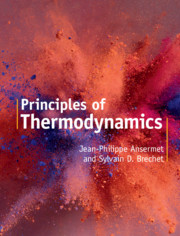10 - Thermodynamics of Continuous Media
from Part III - Continuous Media
Published online by Cambridge University Press: 14 December 2018
Summary
Continuity equations are derived first for extensive scalar quantities, then extended to vectorial quantities. Thus, material derivatives, source densities and current densities are introduced. The formalism is applied to express the conservation of mass and charge. The continuity equation for linear momentum corresponds to Newton’s second law with a stress tensor included to account for deformations in continuous media. Evolution equations for energy are obtained. This approch yields a local Gibbs relation, the relationship betwen intenal energy current density, conductive and convective heat currents and an expression for the entropy source density in terms of generalised currents and forces. This presentation of the thermodynamics of continuous media ends with volume integrations formalises the conceptual link between the local description of continuous media with the description of simple systems subjected to thermal and mechanical processes.
Keywords
- Type
- Chapter
- Information
- Principles of Thermodynamics , pp. 277 - 307Publisher: Cambridge University PressPrint publication year: 2019

